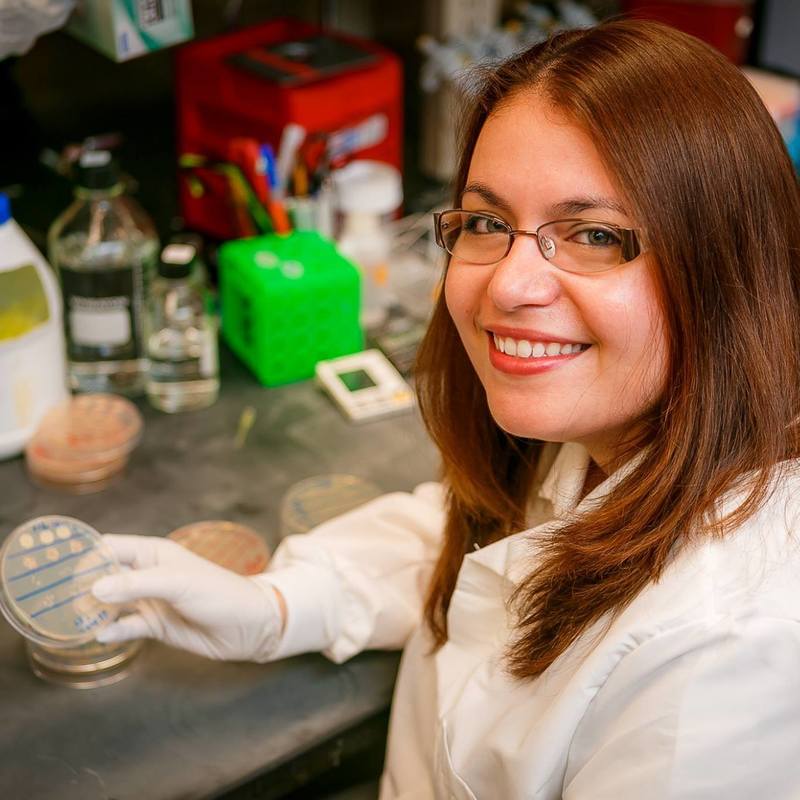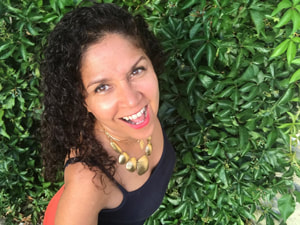|
Sometimes, you meet that great student who knows exactly what she wants to be when she grows up. All she needs is for you to usher her along to bigger and better opportunities. One such student who I had the privilege to mentor is Magdia De Jesus, who I met when she was very young and now she is an assistant professor with her own lab and students. In this guest post, Dr. De Jesus tells us her story. Enjoy!
Since I was 9 years old, I wanted to be a scientist and although the odds made that dream seem impossible, I can tell you that the reason why I am a scientist today is because I AM A PRODUCT OF PIPELINE MENTORSHIP! Hello, my name is Dr. Magdia De Jesus and I am an Assistant Professor, in the Department of Biomedical Sciences at the University at Albany, State University of New York. My research laboratory is located at the Wadsworth Center, New York State Department of Health. I was born in Utuado, Puerto Rico on a very warm and rainy February morning. At seven months of age, I moved to East Harlem, New York City where I lived in a one-bedroom apartment at the Wagner public housing that is part of the NYC Housing Authority (NYCHA). Although my parents had very little education, they both knew how to read and write. My father worked very hard as a marble polisher in a factory located in the South Bronx and my mother stayed at home taking care of my sister and I. Both of my parents understood that the only way that they could give us a better future was by encouraging us to do well in school. From the window of this one-bedroom apartment, I could see the beautiful lights of the Tri-borough bridge that connects Manhattan with Queens and the Bronx. I always wondered what it would be like to cross the bridge into Queens and the Bronx to see what the world had to offer. As a young child, I also dreamed about becoming a scientist and a professor. I became fascinated by a science TV show that I would watch every morning called Mr. Wizard’s world on Nickelodeon. My fourth-grade teacher, Mr. Victor Diaz at P.S. 206 also shared my same passion for science and he incorporated science into everything. Interestingly he did many of the experiments that I had seen on Mr. Wizard’s world. My parents recognized my enthusiasm for science, but they were worried about letting me down as they did not know any scientists or where to even begin. I was very fortunate that my high school the Manhattan Center for Science and Mathematics had a very special partnership with the Mount Sinai school of Medicine. The program was called the Mount Sinai Scholars Program and it was supported by the philanthropic efforts of Edith K. Erhman. The program was unique because it took promising high school student, interested in science and medicine under its wings starting from the 10th grade. The program provided paid summer internships, an SAT PREP course and an invaluable network of scientists and physicians who opened our eyes to both the rewards and challenges of careers in science and medicine. The program also had a unique mentorship model as we not only had the program director Susan T. Cohen to guide us, but all of us had a mentor who we directly worked with and we also had a program mentor who was “our buddy”. I was very fortunate to have Dr. Mark W. Babyatsky, a gastroenterologist and scientist as my research mentor who taught me all about somatostatin receptors in the GI tract when I was 14 years old. As you can imagine it was a dream come true. I was also very fortunate to have Dr. Luz Claudio as my program mentor who is still very much present in my life as a colleague and friend. When I graduated high school, I went to New York University (NYU) where I majored in Biology and I minored in Sociology. At NYU, I experienced several academic challenges and was highly discouraged to continue as a Biology major. My academic advisor said “you are a good student but not a great one, you should consider becoming a teacher” As you can imagine, I was devastated but this advisor’s comment fueled the fire, I knew that I was going to complete my degree and although it took me an extra semester, I became an NYU graduate with a major in Biology and minor in Sociology! During my time at NYU, I had continued to stay in touch with Sue Cohen, the director of the Mount Sinai Scholars Program and Dr. Luz Claudio. With Sue’s help, I was part of the Child Health Plus (CHIP) team that helped recruit and insure thousands of children who did not have health insurance all over NYC. This experience not only taught me a lot about public health and networking, but it let me cross the bridge into Astoria, Queens as Mount Sinai had a satellite clinic there. At the end of the CHIP program, Dr. Claudio also gave me the opportunity to experience more public health through her environmental science summer internship program. While participating in Dr. Claudio’s summer program, Sue Cohen asked me if I would be willing to participate in a new two-year pilot post baccalaureate program that was being developed by Dr. Terry A. Krulwich and Dr. Gita Bosch the Deans of the graduate school at Mount Sinai. I immediately said yes because I understood that this program would be my ticket into a Ph.D. program. The Post Baccalaureate Research Education Program (PREP) gave me the opportunity not only to shadow the graduate students by taking classes but I was also given the opportunity to do my own research project in the laboratory of Dr. Krulwich. I not only learned how to do bench science, an opportunity that I did not get at NYU, but I also learned how to break down and read scientific papers. This was an invaluable skill that Dr. Krulwich pushed hard on me as she would meet me every Wed morning at 8 am in her office to do a journal club type exercise. Dr. Krulwich also gave me the opportunity to present my work at the American Society for Microbiology (ASM) conference in Salt Lake City, Utah. At this particular conference, Dr. Krulwich encouraged me to attend any session during the last day of the conference and I chose to go to the fungal pathogens session where a renowned scientist from the Albert Einstein College of Medicine went into a heated debated with another scientist in the audience who challenged his work. I was impressed by all of these things that I had learned by going to the conference and I will always thank Dr. Krulwich for teaching me not only the science but how to build a thick skin and not let criticism break me. PREP was my bridge to the Bronx, as I chose the to go to the Albert Einstein College of Medicine to do my Ph.D., ironically, Dr. Claudio is an alumnus of Einstein. I also chose to become a graduate student in the laboratory of Dr. Arturo Casadevall, the scientist who was involved in the impressive debate with the audience member at ASM. In Dr. Casadevall’s lab, I learned to do elegant science and during my six years in the program, I learned so much about science, the world and myself. I then moved on to do a postdoctoral fellowship on Emerging Infectious Diseases sponsored by the Centers of Disease control (CDC) and the Association of Public Health Laboratories (APHL) my host institution was the Wadsworth Center, New York State Depart of Health. At Wadsworth, I learned a lot about public health and outbreak investigations under the mentorship of Kimberly Musser, the Director of Bacterial Diseases. I was also fortunate to be able to stay at Wadsworth during the recession and do a second postdoctoral fellowship sponsored by the Howard Hughes Medical Institute (HHMI)- Life Science Research Foundation (LSRF). My mentor Dr. Nicholas Mantis not taught me about mucosal immunology but also to become a stronger writer. Dr. Mantis also became my advocate and was instrumental in helping me obtain my current position as faculty member at the University at Albany and the Wadsworth Center continued to support my growth by providing me with the laboratory space and the tools that I needed to establish my own research program. Currently, my laboratory is full of young, vibrant and diverse students who are eager to learn from me about vaccines and emerging fungal diseases. I have made it a point to pay it forward by sharing the knowledge and skills that I have learned with my students, with children in my community and through the Skype a Scientist program that allows me to have a small impact at the national level. So, you see, dreams are possible even when the odds are stacked against you. All you need to find, are those bridges of opportunity, those selfless mentors who walk with you throughout each leg of the journey and the mentors who will be with you for a lifetime. Thank you, Dr. Claudio for giving me this opportunity to share my story, a story that you helped develop and continue to have significant impact.
0 Comments
Your comment will be posted after it is approved.
Leave a Reply. |
This section will not be visible in live published website. Below are your current settings: Current Number Of Columns are = 1 Expand Posts Area = 1 Gap/Space Between Posts = 8px Blog Post Style = card Use of custom card colors instead of default colors = 1 Blog Post Card Background Color = current color Blog Post Card Shadow Color = current color Blog Post Card Border Color = current color Publish the website and visit your blog page to see the results AuthorDr. Luz Claudio is an environmental health scientist, mother and consultant, originally from Puerto Rico. She is a tenured professor of environmental medicine and public health. Luz recently published her first book: How to Write and Publish a Scientific Paper: The Step-by-Step Guide. Dr. Claudio has internship programs and resources for young scientists. Opinions expressed in this blog are solely her own and may not reflect her employer's views. Categories
All
|
|
Dr. Luz Claudio
[email protected] |
|
Opinions expressed in this website are solely Dr. Luz Claudio's own and may not reflect her employer's views. None of the information on this website should be taken as medical advice.
© COPYRIGHT 2018. ALL RIGHTS RESERVED.



 RSS Feed
RSS Feed